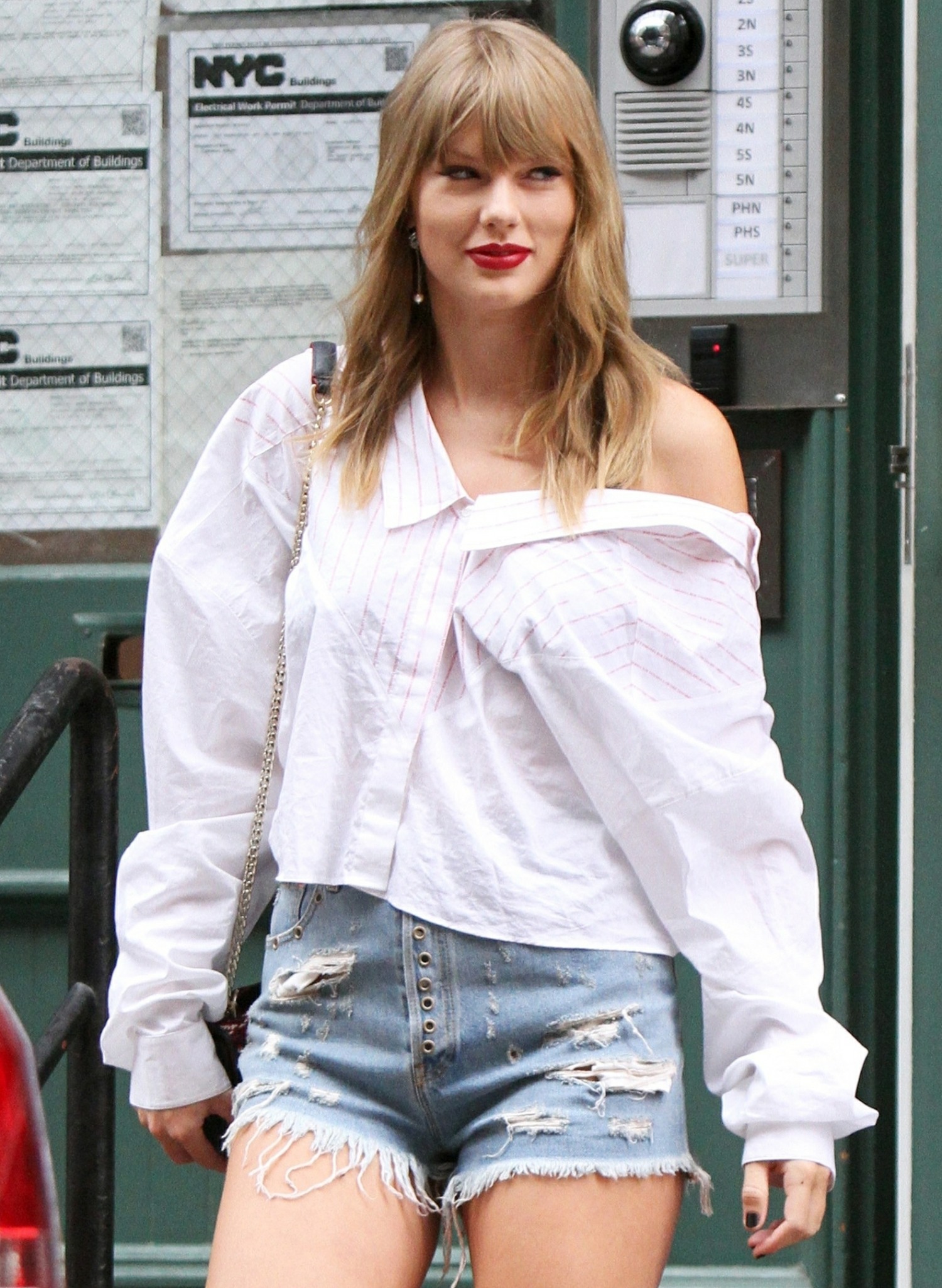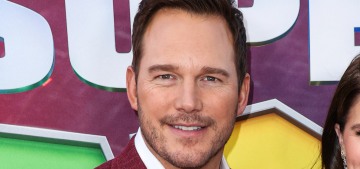Taylor Swift is a very rich and powerful woman. I would argue that she’s probably the most powerful woman in the music industry. Sorry, Beyhive, but I think that’s true? Beyonce has a lot of power, absolutely, but no one but Taylor sits in her unique position of being able to sell her music across the board, with CDs, downloads, Spotify, concerts, all of it. Here’s something I didn’t know though: Taylor Swift doesn’t own her masters, her “master recordings” of all of her albums. Her masters are owned by Big Machine Records. Taylor’s contract with Big Machine ended amicably on November 10th, and she was shopping for the best deal she could get. The best deal meaning money, for sure, but also for her masters, both past and future, and for her future earnings from streaming services. Well, she made a deal:
Taylor Swift has signed a new global recording agreement with Universal Music Group, the company announced today. Under the multi-year agreement, UMG will serve as the exclusive worldwide recorded music partner for Swift and UMG’s Republic Records will serve as her label partner in the U.S. The singer’s previous deal with Big Machine Records, which released all of her previous albums and is distributed by UMG, ended earlier this month.
According to the announcement, the multi-album agreement, effective immediately, deepens the relationship between Swift and UMG and builds upon the success she achieved with Big Machine — the label whose long-term strategic alliance with Republic Records first brought Swift into the UMG family. While terms of the deal were not announced, Swift stated in a Tumblr post that she will own her master recordings going forward, and that UMG will share with artists the proceeds from the expected sale of its Spotify equity, and make them non-recoupable against the artists’ earnings, as Sony Music has done.
“Over the years, [UMG chairman/CEO] Sir Lucian Grainge and [Republic founder/CEO] Monte Lipman have been such incredible partners. It’s so thrilling to me that they, and the UMG team, will be my label family moving forward. It’s also incredibly exciting to know that I own all of my master recordings that I make from now on. It’s really important to me to see eye to eye with a label regarding the future of our industry. I feel so motivated by new opportunities created by the streaming world and the ever-changing landscape of our industry… I also feel strongly that streaming was founded on and continues to thrive based on the magic created by artists, writers, and producers.
“There was one condition that meant more to me than any other deal point. As part of my new contract with Universal Music Group, I asked that any sale of their Spotify shares result in a distribution of money to their artists, non-recoupable. They have generously agreed to this, at what they believe will be much better terms and paid out previously by other major labels. I see this is a sign that we are headed toward positive change for creators – a goal I’m never going to stop trying to help achieve, in whatever ways I can. I’m so happy to have Sir Lucian Grainge as a partner in these efforts.
I’m not going to pretend to 100% understand the details about how artists are paid for streaming, or how Taylor’s deal reflects a significant change. I trust that she made a good deal, and I trust that she’s actually using her power within the industry to pay it forward for other artists too. What I will nitpick is that the Spotify issue was her main concern. I think it was one of her big concerns, absolutely. But she also cared A LOT about owning her masters, and yes, she cares a lot about making the best deal financially. The thing is, I bet she left some money on the table so she could get the other stuff she wanted (ownership of her masters and a bigger cut of Spotify profits). Taylor Swift is still one of the smartest businesspeople in music, huh?
Photos courtesy of Instagram, Avalon Red, Backgrid.















While I’m not a fan of her music, she does know how to run her business and/or she knows how to hire great people to run her stuff for her. I certainly do admire her for that.
Word. It’s a smart move. Simple as that.
Big Machine….the company that her father bought into so she can get a record deal Big Machine.
I still stand by Taylor’s people being the best in the game, for sure.
There is simply no reason to keep taking agency from her – she has shown to be incredibly shrewd and smart ON HER OWN.
She has a TEAM doing it for her. Nothing to do with stripping of her agency. She didn’t do the deal. End of.
Yes. Very smart. I don’t prefer her music, but I admire and respect her business moves. And it says a lot that she ended the BM contract amicably.
I am a bit clueless here…can somebody tell me what it means to own your master recordings? what are master recordings? ps. taylor is such a smart woman. not the best voice, not a good dancer, not the best songwriter even, but so business savy. I admire her a lot.
Master recordings are the first recordings of a song that are used to make copies to sell. Whoever owns the master recordings owns the song and makes the $. They can license the recording to any 3rd party, like commercials, tv, films, etc.
At least this is my understanding of it.
Accurate. Master recordings are specifically the end result of the mastering session, the music that is put onto media for sale. Swift has many if not all of her albums mastered at Sterling Sound in NYC. Master tapes are archives for copies and these days might not always/often are not tape. The owner of the master more specifically owns that version of the track for license use. Labels make money from licensing more than any other part of the industry. We are at a point in music where the artist is expected to make money from touring and merchandise (unless the label has also acquired certain image rights) and the label makes the bulk of its money through license. The artist gets money after the label unless the artist removes the go-between. A part of signing a record deal with a label is often giving up music rights. It’s an exchange as an artist you hopefully get the support needed to sell more records and get more attention resulting in you making more money on tour and being able to resign for a better deal in the future.
Fun fact: there is an ideal way to master for every format, MP3, CD, Vinyl, and even spotify each has it’s own best way to master for good sound.
When you are a signed to a major label, or any label for that matter, they pay for your recordings, give you advances etc. In return they not only re-coup from your sales that money, they also own part or all of your masters. Master recordings are the actual physical recordings of your music. When you make a song it is registered so that whenever it is played on radio, streaming services, live, or is sold you get royalties.
That song broken down into two halves for ownership.
The publishing/songwriting half and then the master half.
Whoever owns the controlling share of the master gets to decide where it gets played, if someone wants to use it for advertising etc, the master primary share owner can decide whether or not it gets used.
Most pop artists if not all ( Beyonce is an exception as well) don’t own their masters.
Basically not owning your master means you don’t own the rights to your songs. As a songwriter you will always get your writers share, but owning the master means you truly own your music.
It also means you make A LOT more money. She just made herself richer than she already is.
It is a really really really good deal that she has brokered for herself.
I dislike her music and most things about her, but I can’t fault her teams business acumen.
Hope this explains it a bit better.
FWIW, this is why Prince changed his name to an unpronounceable glyph, and went around with Slave written on his beautiful face. He wanted to own his own masters.
Beyonce is a powerhouse and is probably more respected in a broader sense. But taylor sells more across the board. Her four past albums sold 1million plus in her first week. I dont think most people realize how huge that is in todays industry. 15 years ago not that impressive but today its huge.
And her tour that everyone was claiming was going to flop was record breaking. Number one grossing female tour ever in the US.
Im sure all the big labels were fighing for her so she could pretty much make her contract however she wanted.
Is Beyonce more respected though? She has fiercely loyal fans and controls her image with the best of them, for sure, but not sure about the rest. There seems to be a regular buzz around Beyonce about taking credit for other people’s work, etc. and while she can sing and dance, not sure anyone thinks of Beyonce as having great business acumen or even being that supportive/engaged with other artists. Taylor may not either, but perception at least, is that she does.
I actually have some insight on this. Beyonce is respected for her image control, branding, and PR. She has a crack team that focuses on socials and PR which results in high fan engagement. This makes her more valuable to her label and gives her more power. While I do not have a window into her deals, I would assume that she has negotiated for a higher split on any form of licensing if not ownership rights. Something to consider is that it is very expensive to make an album with an artist like Beyonce, best producer, best musicians, best mastering, best of everything, if the artist assumes cost then it is easier to assume rights. However, if the artist contract with a label covers those costs then the label is assuming the risk of paying for recording, marketing and distribution.
In Beyonce’s case, I would say it is good business to allow the label to assume cost, her audience is heavily centered on streaming (the labels have done the research) and it takes longer to recoup expense of recording. Beyonce’s business is being Beyonce and maintaining image rights. I would not be surprised if she has a lower split and a contract that includes a guarantee (minimum takehome paid by label) a bonus for each album, etc. She has made obvious moves in the past to show the label they are not needed (surprise drops of an album is a baller way to show a label that you perform without their marketing support and gives an artist leverage) to assert more control of music.
I could write an essay on what all this means in the context of her investment in the Tidal streaming platform, but I’ve gone on too long already.
@HiMe! Thanks, I learned a lot.
Good move on her part. I work in the music industry and people don’t realize how much money is squeezed out of who owns a particular version of a track. Let’s go to school!
Music Business – The Rights Vol. 1: publishing rights cover the music, licensing covers a particular recording of the music. When a label maintains the master rights they keep the tapes and reserve the right to use the tapes as they will. There are multiple ways this content is licensed ie monetized, from use in tv or film, use in ads, to reissuing in multiple formats. Fun fact, each individual music format (CD, Vinyl at each weight, cassette (yes, this still exists), etc) can be licensed and when it is licensed from the owner, it has an individual deal and is paid for by copy usually between 8-18$ per copy. So 1000 copies of a record at 180-gram is $18,000 just for the privilege of releasing the music.
Anyway, for many years emphasis has placed upon publishing right, which in the past were the more lucrative thing. However, with media reissuing (all those new box sets and collections of classic music) the value of the tape license has increased exponentially. Okay, I’ll stop now. But basically Swift (I’m not crediting her team with this, she is known for being very forward thinking in the industry and is incredibly active in selecting people for her team, there are a few musicians in the business who can sit down at a meeting and knew the numbers as well as the reps, Swift is one of them. Most artists rely on having a great manager) is maintaining her ability to milk her own cow.
I am thrilled when any artist is ALSO a good business person who fights for the remuneration he/she deserves, and Taylor is TOPS at becoming very well informed about all business aspects of the music industry. She also thinks outside the box, and decides for herself what direction she thinks is best; I just admire that SO much. Women of older generations so often depended on male professionals for guidance, and some, like Doris Day and many others, found they’d been robbed and cheated for years. Viva education and self determination! It’s all about empowerment.
To my understanding, the Spotify deal she made helps other UMG artists, if UMG ever decides to sell its shares in Spotify. Most labels would keep the money, particularly if they’ve advanced money to the other artists. In this (new) scenario, they’d have to (presumably) pay the other artists outright and not withhold the money under the pretense that money has already been advanced to them.
I definitely think it was also a reputation move on her part. She’s probably just earned some good will among her label mates, which definitely helps her overall, considering the bumpy couple of years she’s had.
Good for her – whatever you think of her music, she’s done incredibly well and makes some very good business moves. And if it helps other lesser known artists as well, even better.
With all the money she’s made them, I’m surprised her previous label didn’t pull out all the stops to keep her.
Universal is the parent company of Big Machine. So it’s not as if Taylor left the company entirely. She just ugraded. BM is actually just a country label. It’s a major niche label but Universal is more equipped financially and internationally. I doubt BM could compete.
Forbes says that her deal could be worth up to 200 millions
The label was definitely willing to pay a lot to have her